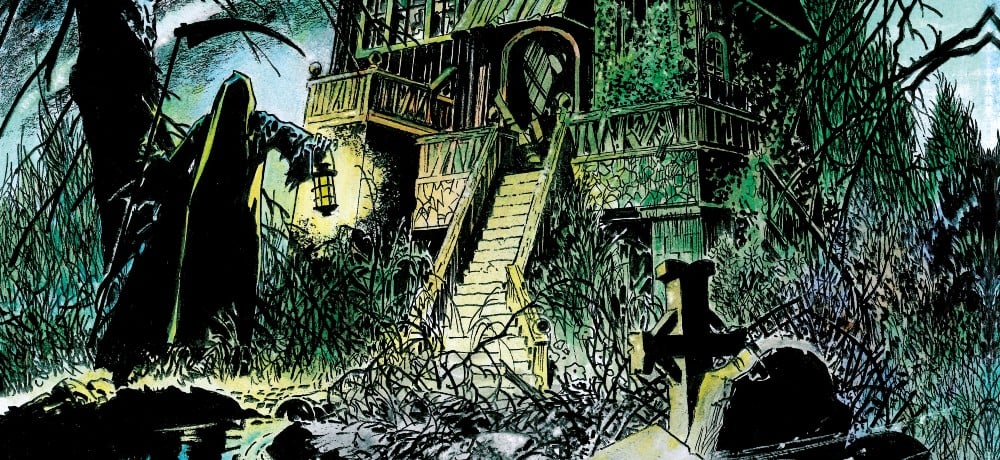






With everything going on right now, I struggled as to whether or not I should put a moratorium on my work for the time being. For the most part, I have, only because entertainment journalism feels a bit futile these days. But at the same time, I thought that maybe digging into a movie where a teenage girl brutally destroys a group of Neo Nazis might be something we could all appreciate right now.
So, with that in mind, here’s my recent interview with filmmakers Jonathan Milott and Cary Murnion (Bushwick, Cooties) about their most recent project, Becky. It's centered around the titular character (played by Lulu Wilson), who squares off against a menacing Kevin James that is hellbent on retrieving a mysterious item from her family’s lake house.
Becky hits selected drive-ins around the country and various VOD and Digital platforms today, courtesy of Quiver Distribution.
Great to speak with you guys again. I enjoyed Bushwick and Cooties and were a great deal of fun too. Was this a script that was brought to you? Or did you just come across the script and decide this is the next thing that you wanted to take on. I'm just curious how the stars aligned for Becky.
Jonathan Milott: I think the independent film world is interesting. We found that we have a lot of things that we are developing and a lot of it will depend on when the cast is available and a lot of other things falling into place. But this was brought to us by the BoulderLight guys and they had an initial script and we loved the premise of it, but we wanted to work with Ruckus [Skye] and Lane [Skye], some writers that we had previously tried to work with, to just build out the premise and make sure it delivered on that.
Because I think that, that's one of the things that can frustrate us with genre films or any type of film is that it has a great premise and then doesn't deliver on it. So, I think the initial script had some great ideas, but we wanted to make sure that once it really kicks in, we're seeing exactly that idea of a brutal, violent Home Alone that takes no prisoners. We said that in the initial pitch to the BoulderLight guys that we love this idea, but we want to make it everything that we think it can be. So that's pretty much what we did; we worked with the writers to get it there.
Cary Murnion: We spent about six months with the writers working on the script with them and then got to a really good place. Then we made it happen with the various financiers to make this movie happen, and everything fell into place from there.
You mentioned Home Alone, and of course there are some parallels, but I do think this is very much is its own thing. What's interesting to me is that when you're dealing with kids, some might expect you to go easy because there's only so much peril you want to see kids face in the movies. And yet, you guys don't really pull away from the violence in this. Can you talk about finding that delicate balance where you’re not shying away from the violence, and there are real stakes, but you’re not torturing this poor girl who has already gone through hell, either?
Jonathan Milott: Yeah, that was definitely was one of the hardest things across the board from the start of the project was finding that right tone. Because like you said, this really should be a fun movie to watch. It shouldn't be the type of movie that you come out of and you're totally depressed. We wanted it to be like John Wick or something that at the end, you feel like you’ve been on a crazy ride. So, I think the balance of the tone, especially when we were working with Lulu and Kevin James, was something we worked really hard to find that right level of performance that you could so easily have Kevin James going over the top and delivering another speech like Dr. Evil or something. We just didn't want it to be like that.
But then we wanted this to have an emotional core that was somewhat grounded, but still had some elements of fun to it. You have to be able to go a little bit over the top, and for us, kids are just inherently violent. They're inherently emotionally unstable, and once you see a kid lose its temper, getting them under control, in our experience, is hard. They just go off, because they don't have the inhibitions and the societal learning to hold back and realize that maybe they're going too far. So, once you set Becky off and once she has crossed the line, it seems almost more realistic to us that a kid would just go and wouldn't stop, especially without parental or police or society restraining them. I don't know, if you've ever seen a kid throw a temper tantrum, it can get pretty crazy fast.
Cary Murnion: That's why we wanted to set up where Becky was pushed to this limit. I mean, she's not some trained assassin who can do these things. She's a normal girl who then loses things in her life and then is pushed to the brink that there's really nothing that is pulling her back any longer. I think that's what was so interesting to us about this film – how can we set up this premise, which sounds kind of out there, but then when you actually watch it, hopefully at the end, it seems plausible at the same time.
As somebody who grew up as a teenage girl, believe me, we are a mess around that age. We are terrifying, so anything is possible (laughs).
Jonathan Milott: Yeah, exactly (laughs).
As I mentioned, I absolutely adore Lulu. I think it's really fun to see her career evolve, and this is a really fantastic role for her. Was there something in particular you saw in both her and Kevin when you were casting them in these roles? It's funny, because Kevin James is such a big guy, and has such a presence to him, and yet, Lulu really holds her own against him here.
Jonathan Milott: Yeah, definitely. We're the same as you, where we had been following Lulu's career, and we have blown away by everything she's in but, especially the maturity of her being in Sharp Objects and The Haunting of Hill House. Those stories are just mature, where there's some dark stuff in there and it's shocking that a kid of her age could comprehend and deal with. So that was impressive.
Then, the minute we started talking to her and working with her, she was just so professional and so able to get to certain levels of performance from her. A funny thing that happened was that we were in the middle of the woods doing a scene where Lulu was doing some physical violence and then let out a primal scream. I was walking up to her to give her some direction and, this is with tears coming down her face and in between the setups, she just calmly turns to me and says, "There's a spider on your head." There was actually a gigantic spider on my head and I freaked out and "Get it off my head." She was so poised and here I was freaking out over a spider.
It was the same with Kevin James. We've been fans of his work forever and loved the idea of having someone as charismatic as him portray this horrible person with these horrible Nazi beliefs, and really thought that. We also thought that it was important for someone to be able to express those horrible ideas in a way that was not crazy over the top at first, that is just conversational and that he's just expressing his logic. But, in the end, as you're hearing the words, you actually understand what he's saying. You're appalled and there's a real conflict there in terms of just being completely grossed out and appalled by this guy you can’t stop watching.
Cary Murnion: I think we always wonder how people get wrapped up in these things and how people follow these people and that kind of ideology because it's morally wrong and horrible, and that seems so easy to understand. But when you meet the actual people delivering the rhetoric, that's a different story. So, if we have Kevin James delivering this, then it makes the whole premise of how him and his crew get into the house, why they're doing what they're doing and how he gets his crew to do what they do, it makes all that a lot more, not just believable, but something that we can understand how it all started, because it was such a far off premise. Having Kevin James being the guy that delivers this message that makes it all the more relatable to the guys who are following his character in this.
It's interesting, because if this movie had been made five years ago, I might've thought that certain aspects of this movie were outlandish. But I think the last few years have shown that no, it really isn't, unfortunately. I was just curious because there are a lot of fun elements to Becky, but there are also these scary elements that have this touch of realism to them as well. Was that conscientious in the back of your minds that there would be a timeliness to a story like this, unfortunately?
Jonathan Milott: Yeah. I think it's exactly the point. We were just discussing that, in the headlines today, there's very blatant racism happening, even in the middle of the pandemic. We are confronted with multiple stories of racism and police brutality and it's just shocking that it's 2020 and it's still happening everywhere. So sadly, in a way, these current events end up as a shorthand for these bad guy. We don't have to do a lot of set up to this for you to know that these guys are bad and you can just immediately realize that they're not there for anything good. Which is scary and unfortunate.
But we also liked the idea of antagonists that have their own justification for their violence. They think they're in the right, because they're executing their plan. And for us, that's the seed for a lot of what's happening, in terms of violence and hate throughout human history. I mean, not to get too grand about it, but there's always someone believing in something and justifying that they're doing what they're doing is just because of it, whether it be political beliefs or religious beliefs or these kinds of hateful beliefs. I don't think we wanted to dwell on it too much or it could become preachy, but I think it was the same with Bushwick and Cooties too, where we love having underlying messages that, if you care to tap into them, they’re there.